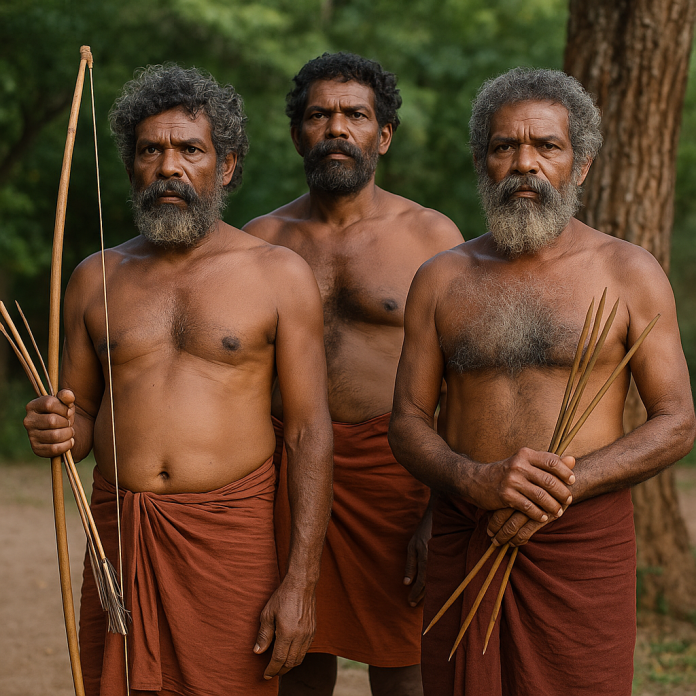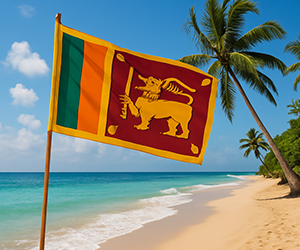Introduction to the Vedda People of Sri Lanka
The Vedda people are Sri Lanka’s earliest known inhabitants and the island’s only indigenous community. With a history that stretches back thousands of years, they represent a living link to the island’s pre-historic roots. Known for their profound connection to nature, the Veddas have lived in harmony with the forests of Sri Lanka, relying on the land for food, medicine, and spiritual guidance. Though modern pressures have impacted their way of life, many Veddas continue to preserve their traditions, language, and values.
History and Origins of the Vedda Community
Anthropologists and historians trace the Vedda ancestry to the island’s ancient Yakka and Naga tribes. Their presence predates the arrival of the Sinhalese and Tamil populations. Archaeological evidence, such as cave drawings and burial sites, suggests that the Veddas have inhabited Sri Lanka for more than 16,000 years. Mentioned in ancient chronicles like the Mahavamsa, the Vedda people once roamed vast forested territories across the island. Over time, many integrated with Sinhala and Tamil communities, but groups in places like Dambana and Rathugala have preserved much of their original identity.
Where Do the Vedda People Live Today?
The remaining Vedda communities primarily live in:
- Dambana (Badulla District)
- Henanigala (Ampara District)
- Pollebedda
- Rathugala
These settlements are often located near or within forested areas like Gal Oya National Park and Maduru Oya National Park. Dambana, in particular, is a cultural center where visitors can interact with the Vedda people and learn about their heritage through guided experiences.
Language and Communication
The original Vedda language is considered a separate dialect with its own lexicon and phonetics, though it has significantly declined. Today, most Veddas speak Sinhala or a Sinhala-Vedda mixed dialect. Some elders in remote communities still remember and use words from the traditional language. The preservation of language is critical to maintaining cultural identity, and linguistic studies are ongoing to document this unique linguistic heritage.
Traditional Lifestyle of the Veddas
Traditionally, the Veddas were hunter-gatherers, relying on bow and arrow hunting, fishing in rivers and lakes, and gathering wild fruits, honey, yams, and herbs. Their deep ecological knowledge allowed them to survive in challenging forest environments. They practiced a subsistence lifestyle, only taking what they needed, and maintained a spiritual respect for nature and animals.
Clothing, Housing, and Tools
- Clothing: Historically, Veddas wore minimal clothing made from bark or simple fabrics. Modern influences have introduced Western-style clothing, but ceremonial occasions still showcase traditional attire.
- Housing: Early shelters were temporary huts made of leaves and branches. Today, most Vedda homes are made of mud, clay, and wattle-and-daub construction.
- Tools: Hunting tools include bows and arrows, axes, and digging sticks. They also use handmade baskets and pots for cooking and storage.
Vedda Beliefs, Religion, and Spiritual Practices
The Vedda belief system is primarily animistic, involving the worship of nature spirits and ancestral deities. Key spiritual figures include:
- Na Yakko (Ancestor spirits)
- Kiri Amma (a forest goddess)
They believe that every rock, tree, river, and animal holds spiritual significance. Rituals include dances, chanting, and drumming during important events or festivals. These practices are not only religious but serve as social bonding events within the community.
Marriage, Family, and Social Structures
- Marriage: Vedda marriages were traditionally monogamous and arranged by families. Ceremonies are simple, focusing on community rather than pomp.
- Family: Extended family units form the core of Vedda society. Elders play a crucial role in decision-making and conflict resolution.
- Social roles: Duties are divided by age and gender, with men hunting and women gathering or maintaining homes.
Art, Music, and Oral Traditions
The Vedda culture is rich in oral traditions. Stories of ancestors, myths, and historical events are passed down through generations.
- Music: Includes chants, drums, and simple percussion instruments. Songs often accompany dances during rituals or celebrations.
- Art: Tribal symbols and natural motifs are drawn on cave walls or used in body painting.
- Storytelling: Oral tales reinforce social values, forest wisdom, and spiritual beliefs.
Challenges Facing the Vedda People
Modern challenges have greatly impacted Vedda communities:
- Deforestation and loss of land due to development projects
- Encroachment by agriculture and settlements
- Lack of access to healthcare and education
- Cultural dilution as younger generations assimilate into mainstream society
These issues threaten their unique identity and way of life, leading to calls for urgent preservation efforts.
Modernization and the Changing Vedda Identity
While some Veddas maintain traditional lifestyles, others have adapted to modern life. Education, technology, and economic opportunities have reshaped Vedda identity.
- Some work in agriculture, tourism, or as forest guides.
- Younger generations are often bilingual and use smartphones and social media.
- Cultural blending has occurred, but efforts are made to retain key traditions.
Government and NGO Support
Various initiatives have been launched to support the Vedda people:
- Cultural documentation projects by NGOs and universities
- Community development programs promoting education and healthcare
- Legal recognition of land rights remains a contentious issue
However, there is still much to be done to ensure that their voices are heard in national policy and conservation efforts.
Vedda Cultural Tourism
Eco-tourism in places like Dambana has opened a window into Vedda life. Visitors can:
- Attend cultural shows featuring dances and songs
- Participate in guided forest walks with Vedda elders
- Learn about medicinal plants, foraging, and spiritual practices
Tourism helps generate income for the community but must be conducted ethically to avoid exploitation.
How to Respect and Engage with the Vedda Community
- Seek permission before taking photos
- Avoid treating people as attractions
- Buy local handicrafts to support the economy
- Use community-approved guides for cultural tours
Respecting Vedda customs ensures that your visit is enriching for both sides.
Why the Vedda Culture Matters Today
The Vedda people are custodians of ancient environmental wisdom and sustainable living. Their understanding of nature, resource use, and community values is especially relevant in today’s climate crisis.
- They teach us how to live lightly on the land
- Their culture shows the value of oral history and intergenerational learning
- Vedda knowledge contributes to biodiversity conservation
Conclusion
The story of the Vedda people is not just about the past—it’s a call to protect a living culture. As Sri Lanka modernizes, it must also honor its roots by empowering the Vedda to preserve their heritage. By visiting, learning from, and supporting the Vedda communities, we play a part in safeguarding one of Asia’s oldest and most resilient indigenous cultures.




